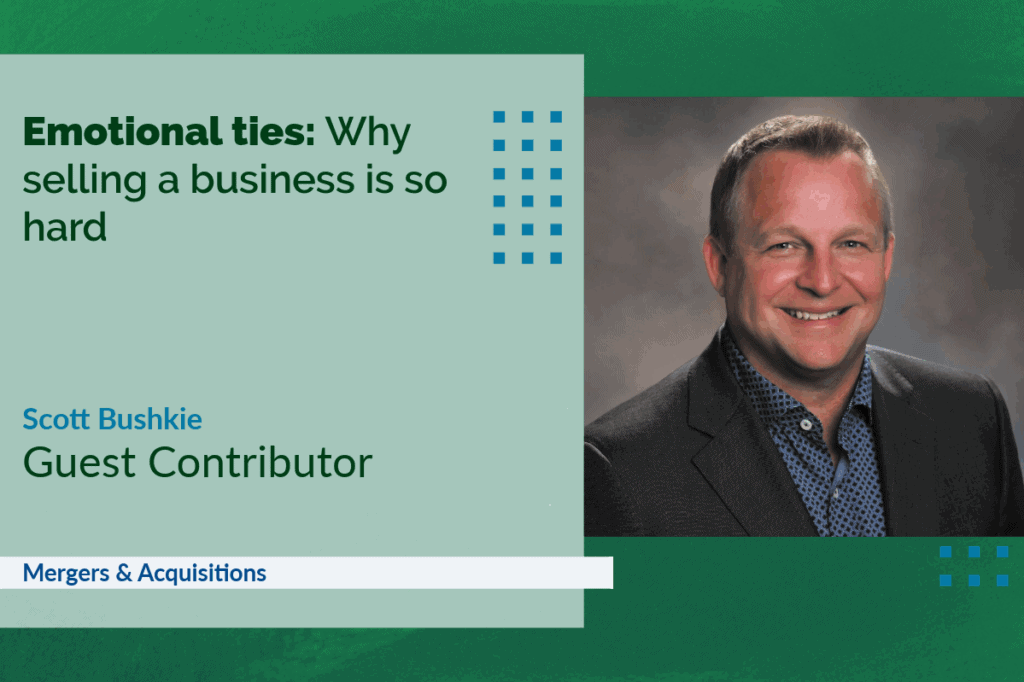
August 25, 2025
Business owners are often known for their grit, innovation and problem-solving ability.
Over time, they build more than just companies – they build livelihoods for employees, legacies for their families and contributions to their communities.
And yet, for all their expertise and resilience, many of these same business owners struggle with one thing: letting go.
Not just a business
Earlier this year, Cornerstone commissioned a third-party national study of 750 business owners between the ages of 45-50.
These were successful people, running companies with $5 million to $100 million in revenue.
What we found was eye-opening.
When we asked about their mindset around selling, the No. 1 response was: “I plan to run my business until I’m physically or mentally unable to continue.”
That’s not a strategy – it’s a crisis waiting to happen.
What’s behind that mindset?
Nearly two-thirds (65%) of respondents said they’re deeply emotionally tied to their business.
When we dug deeper, we found out why.
The data shows that 76% founded their company, building it from scratch.
Another 16% inherited it from family, creating deep emotional ties that extend beyond financial considerations.
When you’ve poured your life into a business – or are carrying forward a family legacy – it’s not just an asset on a balance sheet.
It’s personal.
That emotional investment is understandable.
But it often becomes a barrier to planning, especially when it comes to their exit strategy.
First-time sellers, high-stakes sale
We learned that 92% of sellers had either started their business or purchased from family.
Another 5% purchased their company from their employer.
But only 3% of the business owners surveyed had purchased a business from an unconnected third party.
That means when it comes time to sell, most business owners are navigating the largest financial transaction of their lives without prior experience.
And unlike other areas of business, there’s no trial and error here.
You typically only get one chance to do it right, without risking serious damage to the business and its value.
Compounding this challenge, more than 60% of owners said they’d never had their business formally valued – not even once.
Many relied on informal assumptions, quick “back of the envelope” math with a CPA, creating an assumption with a financial advisor or rough estimates based on hearsay – i.e., “I heard Sam and Ann got a six multiple when they sold.”
That’s risky.
Without a current and accurate understanding of market value, it’s nearly impossible to make informed decisions about when to sell, how to plan, or what kind of lifestyle the proceeds might support.
Timing is everything
Again, more than 40% of business owners said they planned to run their business until they couldn’t anymore.
Maybe that kind of relentless drive feels admirable.
But it leaves little room for preparation.
It also increases the risk that a personal health event or unforeseen emergency will force a rushed sale – one that will not reflect the true value of the company or protect employees and stakeholders.
The more time an owner has to plan, the more likely they are to increase company value, reduce tax burden, get better deal terms and preserve their legacy.
Finish strong on your terms
The message is not that every business should be put on the market immediately.
Rather, the recommendation is to start planning earlier, even if a sale is years away.
Even if you’re not ready to let go.
Planning means seeking a professional valuation – one that isn’t based on formulas alone – to understand current market value.
It means understanding your options for exiting your business, investigating tax strategies and exploring what an “ideal retirement” or post-exit lifestyle would require financially.
From there, owners can determine if they’re on track or if they need to grow the business further to meet their goals.
Planning is a form of protection
Waiting to plan until you “feel ready” is a gamble.
You don’t need to decide now.
But you do need to start planning – while you still have time, options and energy.
Understanding what your business is worth, what you’d net after taxes and what lifestyle that supports gives you clarity.
It also gives you control.
Because when your business is part of you, planning isn’t just practical – it’s personal.
 Encore: Music U reopens on Green Bay’s east side
Encore: Music U reopens on Green Bay’s east side CWIMA Summit & Expo: ‘A new adventure every year’
CWIMA Summit & Expo: ‘A new adventure every year’







